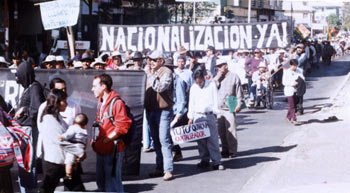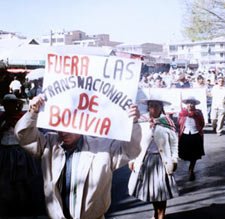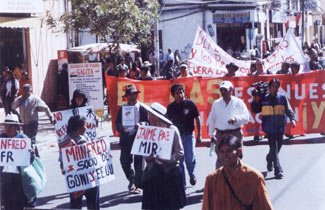


A Referendum Divides Bolivia
On July 18, the Fate of the Gas Resources in the Heart of the Continent Will Be Decided
By Alex Contreras Baspineiro
Narco News South American Bureau Chief
July 6, 2004
COCHABAMBA, BOLIVIA: The upcoming referendum in Bolivia has accomplished what various neoliberal governments, including military dictatorships, even the United States’ own policy, could not: dividing the popular movement and challenging its leaders. A great question mark now hangs over this country’s future.
 A recent demonstration against the referendum and for the nationalization of Bolivia’s gas Photos: Alex Contreras Baspineiro, D.R. 2004 |
The Coordinating Committee for the Defense of Gas and Autonomous Social Monuments resolved at a meeting yesterday in Cochabamba to use to all forms of protest to reject the five ballot questions.
“Those questions,” read the committee’s declaration, “are no more than a consolidation of the privileges awarded to multinational corporations under (overthrown ex-president Gonzalo) Sanchez de Lozada’s Law 1689.”
Textile-workers’ leader and movement spokesman Oscar Olivera said that if the government does not listen to the people’s basic demand to include a question on nationalization in the next few days, the movement would encourage abstention, an “X” across the entire ballot, or the writing of the word “nationalization.”
The Central Obrera Boliviana (COB, the main Bolivian labor federation) called for civil disobedience and voter abstention, although due to conflicts between specific unions, it did not do so with the support of all its member organizations.
 |
Felipe Quispe, the executive secretary of the Bolivian Farmworkers’ Federation (CSUTCB in its Spanish initials), said that there would be a “state of siege” throughout rural Bolivia.
“There are already mobilizations, there will be roadblocks, there will be an organized boycott,” said Quispe. “Many areas will not receive ballots; the ballots will be burned. In other places, people will not participate.”
Other radical minority groups are organizing to close voting centers on the day of the referendum, although such action would be illegal and unconstitutional.
The Split
Meanwhile, the principal political party of the lower classes, the Movement Towards Socialism (MAS), has decided to actively participate in the referendum. Coca growers’ leader and national congressman Evo Morales began a massive campaign yesterday to encourage participation. The campaign will ask voters to answer “yes” to the first three questions and “no” to the last two.
“Those who boycott and oppose the referendum are defending the policies of ex-resident Gonzalo Sánchez de Lozada,” said Morales. “The majority of the Bolivian people want to strengthen democracy, and that is why they will participate in the referendum. Now, if the government does not hear the popular clamor for nationalization, we will take to the streets and the highways to demand it.”
The binding referendum consists of three questions:
- Do you agree with the repeal of Hydrocarbons Law 1698, passed by Gonzalo Sánchez de Lozada?
- Do you agree with the recovery of all hydrocarbon property from “the mouth of the well” for the Bolivian State?
- Do agree with re-founding Yacimientos Petrolíferos Fiscales Bolivianos (state oil company), recovering state property held in Bolivians’ stocks in the privatized oil companies, in a way that will allow it to participate in the entire process of producing hydrocarbons?
- Do you agree with President Carlos Mesa’s policy of using the gas as a strategic resource to gain useful and sovereign access to the Pacific Ocean?
- Do you agree with Bolivia exporting gas in a way that covers local consumption, promotes the industrialization of the gas within the country, charges oil companies taxes and/or usage fees of up to fifty percent of the value of oil and gas production, and uses these resources primarily for education, healthcare, roads and jobs?
President Carlos Mesa, in a clear example of extortion of the Bolivian people, said several days ago: “The referendum is the policy that the government presents for the country’s consideration. Why this policy and not another? Because it is the one I believe in, and nobody can or should do something that he does not believe in. If I lose on a question that forces me to do something I do not believe in, I see no other choice but to leave.”
The traditional political parties, which represent the oligarchy, the business class, and sections of the middle class have divided just like the popular movement. The former allies of Sánchez de Lozada and members of the Movement of the Revolutionary Left (MIR) and the Revolutionary Nationalist Movement (MNR) are in favor of the referendum, while the New Republican Force (NFR) is timidly opposed. However, all of these organizations support the transnational corporations.
The rest of the political parties, as well as the unions and social, civil and neighborhood organizations are fractured. The Catholic Church, with a great influence over the Bolivian people, has called simply for respect for constitutional norms.
The System
While the social and popular movements are divided over the referendum, the Bolivian government is in a phase of systematic consolidation.
 |
This brief statement – according to many Bolivian media – reflected a dramatic change in U.S. policy toward this country. Apparently, the destruction of the coca leaf and the so-called war on drugs have taken a back seat since October 2003, when the “gas war” broke out.
The president’s chief of staff, José Antonio Galindo, confirmed that since October, the White House has not touched on the subject of coca as it had in previous years. “Relations are good,” he said.
Although a recent report from the U.S. State Department’s Bureau of International Information Programs labeled Bolivia, together with Venezuela and Haiti, as a countries in “critical condition,” it sees the division within the social movement as comforting.
Despite the poverty this country faces, the government is spending more than $800,000 dollars in its campaign for the referendum. Some of these resources come from a donation from the Andean Promotion Corporation (CAF), according to Jorge Cortés, presidential delegate for the promotion of institutional development.
At the same time, recalling the previous authoritarian Bolivian governments, it was revealed a few days ago that Francesco Zaratti, the presidential delegate for capitalization revision, receives $5,000 dollars every month from the transnational gas companies. The official documents demonstrate that the Petrobas and Total companies – through the Bolivian state oil company – are paying the salary of the official charged with inspecting those corporations’ work.
Responding to calls for a boycott and the rejection of the referendum, President Mesa announced that the government will use all available means, including the Army and the National Police to guarantee peoples’ democratic rights.
What is certain is that this referendum, which has managed to divide the Bolivian social movement, is only one battle in a larger struggle. The war for hydrocarbon nationalization is coming.
Lea Ud. el Artículo en Español
- The Fund for Authentic Journalism
For more Narco News, click here.




